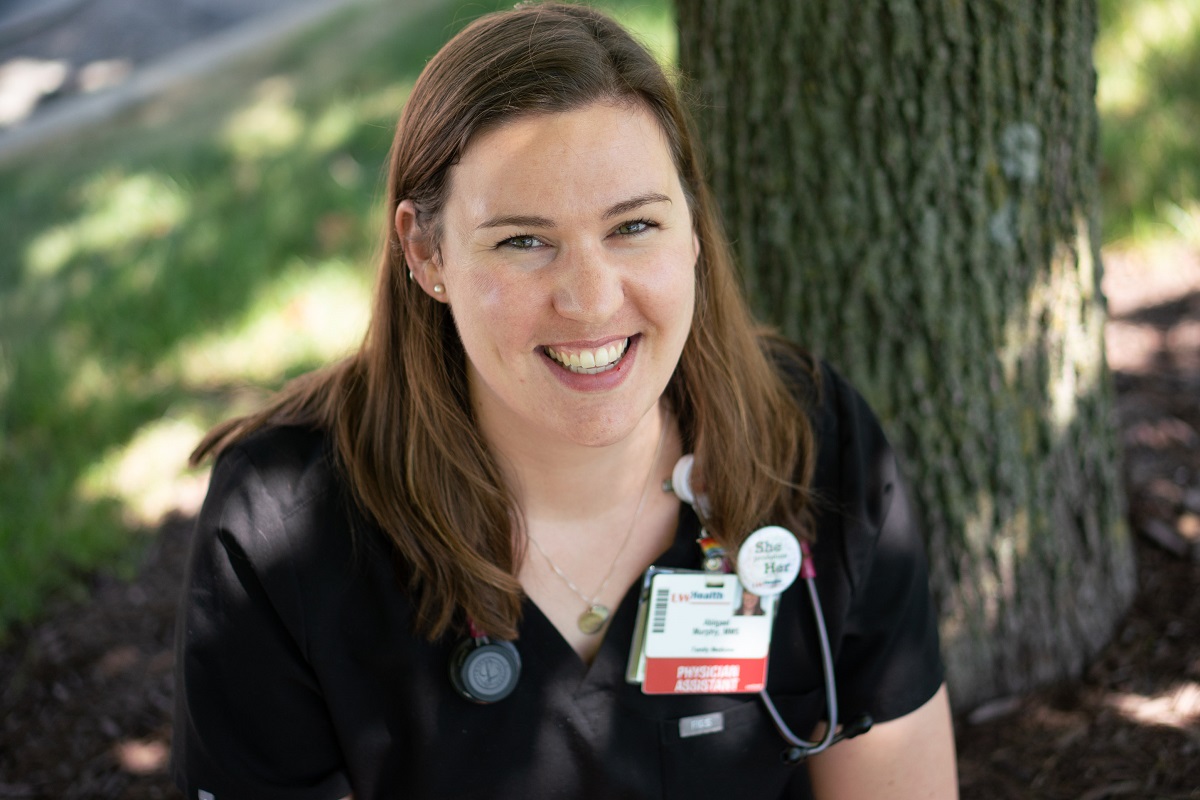
APP Champion: Abby (Abigael) Murphy, PA, Family Medicine, UW Health Odana Atrium Clinic
Abby was drawn to UW Health not only because of its academic reputation but because UW Health strives to be an inclusive and equitable workplace. As a physician assistant in family medicine, Abby says she loves the variety it provides. She gets to see patients from birth to old age and no two days are ever the same. She often cares for the entire family and gets to watch them grow and thrive.
“Transgender health has become a new aspect of healthcare I am proud to call a new specialty,” Abby says. “The last few years have brought in a boom of transgender patients. I offer guidance for hormone replacement therapy, gender affirming care and mental health resources, all of which are available at UW Health.”
UW Health supports transgender, gender expansive and nonbinary adults and children, not just by providing high quality clinical services, but also by working with community partners to support each patient’s unique physical, emotional and social needs.
“Recently, I’ve seen an increase in transgender, gender nonbinary and gender fluid patients in our younger patient population,” Abby says. “I think a lot of this increase has to do with the fact that people becoming more acutely aware of UW Health’s commitment to the LGBTQ+ community.”
In fact, UW Health is designated as a “Leader in LGBTQ Healthcare Equality” in the Human Rights Campaign 2020 Healthcare Equality Index. A record 765 healthcare facilities actively participated in the 2020 survey, and 495 — including UW Health’s three hospitals — earned the coveted “Leader” designation with a top score of 100. Our Gender Services Program is a key part of our comprehensive commitment to exceptional and affirming care.
Abby’s roots run deep in the Midwest, having grown up in the Sauk Prairie area of Wisconsin. She went to undergraduate school in Pittsburgh, earning a Bachelor of Science degree from Chatham University. She then earned her Master of Science degree from Baldwin Wallace University. After spending three years in Denver working in women’s health and primary care, she moved to Madison about three years ago with her partner, Michelle.
“I have a special passion for underserved populations, including the LGBTQ+ community,” she continues. “As a member of the LGBTQ+ community myself, I understand the challenges. It’s a personal goal of mine to be a provider who is open and accepting of all patients.”
When asked to recall a memorable moment in her career that stays with her, she says it’s hard to pick just one. But whenever she is thanked for recognizing someone for who they truly are, being respectful of their pronouns, that is a win. “Being told that my patient is ‘so excited to have a queer provider’ — these moments remind me why I so enjoy doing what I have the privilege of doing every day, which is caring for and supporting others on their life journey.”
Abby said she recently saw a patient in his early 50s who told her it was his first time coming out to a clinician. Another patient told her she had never seen a provider who was also a member of the LGBTQ+ community before. “I always ask patients what their personal pronouns are. It’s motivating to see how happy and positive my patients are when they leave my office after first being uncertain how honest they could be in their visit.”
Abby often spends her free time seeking out and bringing more attention to LGBTQ+ resources available locally. She says she often advocates for providers to have more CME training and diversity training.
“Gender expansive children and adolescents often have many questions. I use my time to listen, accept and learn about needs and offer support and resources to help them on their healthcare path.”
Abby is appreciative and thankful for her team at the UW Health Odana Atrium Clinic in Madison. She says everyone is passionate about our patients, and about learning and growing—both emotionally and intellectually, on both an individual and team basis. “No one ever seems satisfied being stagnant, complacent or ‘good enough.’ We enjoy getting to learn from and with our patients every day.”
Being a healthcare worker is difficult, especially now working during a global pandemic. Days are long, patient volumes are high. She says her patients teach her so much about herself, including reinforcing the importance and power of basic respect and friendliness. “Verifying name and pronouns, some quick chatting about their interests, pets and/or family, and a friendly smile — with the eyes these days — does so much in such an easy, short period of time.”
